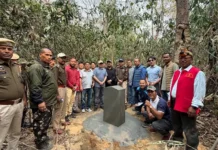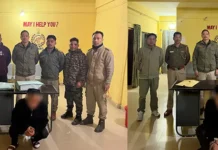[ Taba Ajum ]
ITANAGAR, Aug 6: The Centre’s move to scrap Article 370 from Jammu & Kashmir has raised apprehensions in the Northeast (NE) region where several states enjoy special status.
Fear has gripped the region, and it even forced Nagaland Governor NN Ravi to issue a statement that the government of India is committed to Article 371 (A).
In Arunachal Pradesh, which is protected under the Bengal Eastern Frontier Regulation (BEFR), 1873, the people’s reactions have been mixed. A section of the citizens believes that the situation in Jammu & Kashmir is different and therefore the possibility of scrapping the BEFR does not arise. Meanwhile, debates and discussions on the subject are flowing fast on various social media forums.
The BEFR, originally imposed by the British in 1873, was later adopted by the government of India. This regulation prohibits outsiders from owning properties in the state, and they require inner line permits (ILP) to enter the state. The members of the Sangh Parivar have always been averse to the provision of the BEFR, and many have questioned the need to have ILPs to travel within the country.
Kaling Jerang, the secretary-general of the People’s Party of Arunachal – the state’s lone regional party – has endorsed the Centre’s move.
“Considering the decades-long problem of cross-border terrorism in Jammu & Kashmir, everybody felt that a tough no-nonsense policy had to be adopted,” he said.
Jerang also suggested that India adopt the American style of governance, with the system of equal representation from all the federal units, irrespective of the population and the size of the states, in the parliament, through the Rajya Sabha.
One of the respected political commentators of the state and professor of political science at Rajiv Gandhi University, Dr Nani Bath, said the decision of the Narendra Modi government on Article 370 came earlier than expected. He also said the move has opened several possibilities in the NE region.
“It indicates that the Nagas will have no separate flag or constitution. Also, the BEFR may face the same fate as Article 370. Further, Hindi may be imposed as official language, maybe through a different means. Article 371 (A) and 371 (G) may also be revisited,” Dr Bath warned.
But he added that he supports the move to create a union territory status for the Ladakh region.
The general secretary of the All Arunachal Pradesh Students’ Union, Tobom Dai, said any big change in a democracy should pass through debate, discussion and dissent.
“It is worrisome to see that such measures were not taken while scrapping Article 370, and the whole state of J&K was militarized before announcing the decision,” Dai said.
Student leader Tanya Agu said the move is a direct threat to the whole of NE region.
“The immediate scrapping of Articles 370 and 35 (A) from J&K by the Modi government was a surprising move for all of us. This is a direct and open threat to the people of the Northeast regarding the various provisions of Article 371 (A), the BEFR, etc. If the people at the helm of affairs in the Northeast don’t act immediately and wisely, the day is not far when the Modi government will do the same with the northeastern states,” Agu opined.
The state BJP unit has dismissed any such fear and said the government of India would not take any such step.
“As of now, the government of India has not made any announcement on the BEFR. Therefore there is nothing to comment. However, we are confident that the government will work for the safety and security of the NE people and will not revoke the BEFR,” said the state BJP’s chief spokesman, Tadar Dominic.
While it is still early days, the sudden move of the BJP government at the Centre to scrap Article 370 has definitely unnerved the whole NE region. There is fear, but also the hope that, considering the uniqueness of the region, the government may not remove the constitutional provisions safeguarding some of the states in the region.
In Mizoram, several academicians, politicians and civil society members expressed fear over the possibility of withdrawal of Article 371 (G) of the constitution which states that the parliament cannot decide on matters of religious and social practices of the Mizos, the civil and criminal laws of the land, land ownership transfer, and the customary law procedure without the consent of the state assembly.
The provision came into effect in 1986, following the signing of the historic Mizo Accord between the Centre and the erstwhile underground Mizo National Front.


